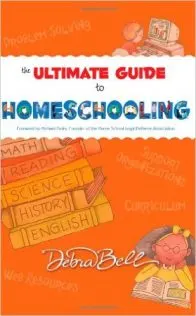Welcome back! In part 1 of the Beginning Homeschooling series, I showed you the steps necessary to begin homeschooling your children. Part 2 will look more closely at great homeschooling resources and home education laws.
Do Your Homeschooling Homework With Books
Homeschooling is a herculean task, even when homeschooling just a single child. So, do your homework, and do it well. The best advice I can give you is to read, read, read, and then, read some more. Devour every book you can find on the subject. Also, chat with other homeschool parents—veterans and beginners alike. Invite them over for dinner, out for a lunch date or a coffee break. If you don’t know any fellow homeschool parents, there are organizations that can help you to connect. So, grab a cup of tea, get comfortable, and let’s take a peak at some of the best homeschooling resources.
Best books:
- The Ultimate Guide to Homeschooling by Debra Bell
- Debra Bell is a veteran homeschool mom of 4 and in this truly ultimate guide, she walks you step by step through the decision making process all the way through high school graduation and beyond.
- Homeschooling for Success by co-authors and homeschool veterans Rebecca Kochenderfer and Elizabeth Kanna, also co-founded one of the largest online homeschooling sites–Homeschool.com.
- Beyond Survival: A Guide to Abundant-Life Homeschooling by Diana Waring, veteran homeschool mom of 3, speaker, musician, and playwright. Waring shares her passion for “Abundant Life” homeschooling and the little morsels of insight gained from fellow homeschoolers while traveling throughout the United States.
- The Homeschooling Book of Answers: The 101 Most Important Questions Answered by Homeschooling’s Most Respected Voices by Linda Dobson. Linda has had her hands in homeschooling since the mid 1980’s and is the acclaimed author of several other excellent homeschooling resources.
- So You’re Thinking About Homeschooling: Fifteen Families Show How You Can Do It by Lisa Welchel
- Lisa Welchel’s all grown up now and teaching her own children all about the facts of life, at home. Lisa homeschooled all three of her children for many years and lived to tell us about it. Seriously, this is a wonderful compilation of homeschooling journeys from different families, all with their own unique take on home education.
Do Your Homeschooling Homework Online
Best Websites:
- Homeschool.com
- Parent at the Helm
- The Homeschool Mom
- A to Z Home’s Cool
- Homeschool World
- Best Organizations:
As homeschoolers, the HSLDA is your new best friend. The HSLDA or Home School Legal Defense Association = a peaceful homeschool journey. Founded in 1983 by fellow homeschool dads and lawyers, Michael Smith and Michael Farris, the HSLDA works tirelessly to ensure that you can safely and legally educate your children at home.
A yearly subscription costs $120 or $10 per month and offers the following benefits: free homeschooling legal advice and support, discounts on curriculum, teaching resources, and webinars sold in their store, discounts on merchandise such as hotel reservations, magazine subscriptions, healthcare, online classes, car rentals, and so much more through their PerX Program, graduation supplies, photo IDs, T-shirts, and access to expert homeschooling consultants.
Follow Your State Homeschooling Law
First things first, in the United States, it is legal to homeschool at any time. If you have a kindergarten ready child or if your child is currently attending a public or private school, you can homeschool. Procedures vary from state to state, of course, but know that you do always have the option to home educate your children.
It is vital to comply completely with your state’s home education law. Lisa Rivero of the Davidson Institute for Talent Development advises prospective homeschool parents/teachers to look closely at your state homeschool law, paying specific attention to the following aspects:
- Notification: who and when should you notify of your intent to homeschool; what documents are mandatory
- Attendance: are there any attendance requirements based on age and amount of time spent learning
- Qualifications of Parents: does the homeschool parent require any specific credentials
- Curriculum: are you required to teach specific subjects
- Contact with Authorities: are homeschool parents required to connect with the local school district at any time during the homeschool year
- Assessment: what methods of assessment, if any, are required
- Records: what type of records are you required to keep, such as a log noting days spent homeschooling, subjects taught, etc.
- Special Education Requirements: if you have a special needs child, what is required above and beyond the basic homeschooling requirements
Get Ready, Get Set, Plan!
It’s official! You’re a homeschooler. Now what?
As a veteran homeschool mom, I suggest that you plan your first week of home education, only. At the end of the week, pause, and consider how things went. What were the strengths of your program, teaching methods, specific curriculum? Were there any weaknesses? Always ask for your “students'” feedback too! Be wary, though, you may get more than you bargained for. Chatterboxes may go on and on, complainers may get under your skin, and your “I LOOVE school” kiddos may have your mind reeling with a plethora of ideas. It’s all good though! Happy homeschooling, and stay tuned for part 3 in this series–Scheduling, Curriculum and Planning.


The Organized Mom's Guide to Beginning Homeschooling - The Organized Mom
Saturday 17th of December 2016
[…] Organized Moms Guide to Homeschooling Part 2 (Resources and the law!) […]
The Organized Mom's Guide to Beginning Homeschooling Part 3: Curriculum, Schedules, and Planning - The Organized Mom
Saturday 17th of December 2016
[…] Organized Moms Guide to Homeschooling Part 2 (Resources and the law!) […]